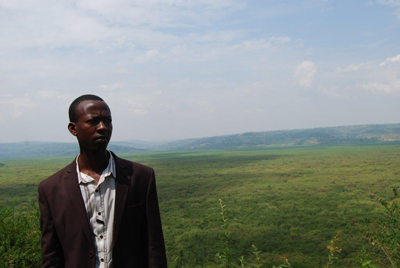
Now working with international aid agency World Vision in helping people to come to terms with the butchery that took place 10 years ago, Mwenedata is in Australia to talk about the progress his country has made. DAVID ADAMS reports…
Gilbert Mwenedata was just 19-years-old when he and his family were forced to flee their home and hide in a swamp as death raged across Rwanda.
Five weeks later, when the then student emerged from the swamp, it was without his mother and sister, who along with many members of his extended family and friends were among the more than 800,000 people who died during the “100 days of madness” when Hutu extremists rampaged through the east central African nation from April to June, 1994.

Gilbert Mwenedata and World Vision chief executive Tim Costello release 10 doves to commemorate a decade of peace in Rwanda at Melbourne’s Federation Square. Photo courtesy of World Vision.
Tim Costello told those gathered in Melbourne to commemorate the anniversary that while the progress in Rwanda over the past 10 years has been commendable, there was still a long way to go.
“The job does not just rest with Rwandans though,” he said. “We, the international community that failed Rwanda in her time of need in 1994, must not fail her now as she faces additional challenges to the genocide.”
Costello said Australians have given more than $10 million to assist those affected by genocide in Rwanda over the past 10 years but said it was vital the assistance continued.
• Anyone wishing to make a donation to World Vision can call 13 32 40.
In Australia to commemorate the tragic events of that year (which he officially marked in Melbourne on April 7 by releasing 10 doves with World Vision chief executive Tim Costello), Mwenedata says that as well as remembering the terrible events of 1994 which left as many as 300,000 children orphaned and millions without a home, this week was also a celebration of what had been achieved in Rwanda since.
“We learned many lessons from the genocide,” he says. “One lesson is that we have to go ahead even though…we had this bad experience. We must go ahead and look at other ways of having a better future. I think we have to come to terms with our lot and to rebuild our lives and our country.”
Gilbert, now 29, was in his home village on holidays from his studies at a Kigali seminary when the killings began. He and his family fled into a swamp when they learned of what was happening and remained there for the next five weeks. But even there, Mwenedata now recalls, they were not safe.
“Many people were killed there and even those who survived they have many scars and they having been seeing such things which affected them even after the genocide.”
After he returned home, Mwenedata found the seminary where he had been studying closed. He attended another college and soon became involved in healing and reconciliation workshops. Then, in 2001 Mwenedata began working with World Vision in assisting people to tell their stories part of the organisation’s healing, peace-building and reconciliation program. He now trains volunteer counsellors.
“We are helping people to have a time of bereavement because during that time many people didn’t get and opportunity to even weep or cry for what was happening to them so that is why now we are trying to help them…” he says. “It is a challenge, but we have to face it and we have to overcome it.”
Mwenedata adds that it is only by the grace of God that those who witnessed the killings in 1994 have been able to move on.
“I can say that even God is helping us. For myself, I think that we can achieve nothing but when I see the situation, I think there is the hand of God in what we are doing…”
He adds that being able to share passages from the Bible and pray with survivors has been a very positive experience.
Mwenedata says that while the shadows of past horrors are still ever present in Rwanda, these days he sees “people living together and sharing what they have”.
“I can see say there are many many things which have changed just after the genocide. It is giving me hope for the future.”





